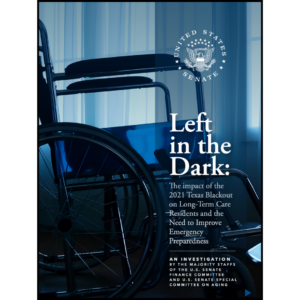Sudden power outage
A couple of weeks ago, I was writing on my laptop in bed when the power went out. Although it was still light outside, my room became very dim. My previous nursing home power outage experiences occurred at a small, farming community facility where power outages were frequent and lengthy.To help me cope, I kept a rechargeable flashlight and other flashlights and batteries in my room.
As I sat in the gloom, I remembered that I put my call light on before the power failed. Several minutes later, my aide came in. I asked if she would set me up with my battery-operated CD player and an audio book after the other residents were settled. I reminded her I had nothing to occupy myself. She said she would return and left to take care of the other residents.
After living here for more than four years, this is only the second power outage. The previous one was three years ago during a summer storm. During that power failure, for some strange reason, my air conditioner and TV stayed on. So I was comfortable and engaged until the power was restored.
This time, I listened intently for hallway noise. But I heard no hurried steps or anxious cries for help. I checked to see if my emergency bed crank was in its spot—and discovered it missing. Without power the only way to adjust my home care bed is with that crank. For me, it was becoming the beginning of a long evening.
Though I tried to remain calm, fear rose in my throat. I put my call light on. I wanted to tell the aides about my missing crank. Two aides came in and seemed unconcerned about the missing crank. When I expressed concern about lowering my bed, one told me she was not interested in my bed adjustment issues and she left. Startled by her insensitivity, I began to cry.
A few minutes later, my nurse had me moved into the hallway until the power resumed. My bed was put by a generator outlet, plugged in and lowered. I was then moved to the other side of the hall. An aide propped up my watch so I could see the time.
When the other residents were situated, my battery-operated CD player and library audio books were brought to me. When I saw there was no engaging title and I realized I needed new batteries, I had an aide put them back. I decided I did not want to further overwhelm the staff.
I laid in the hallway feeling on display. My world felt very small. We learned that a car had hit a pole and knocked out a transformer. The power came back on a couple of hours later. It was another half hour before I got back into my room and was readied for sleep, which didn’t easily come. I knew I needed to ask questions about a better backup plan for me during power outages.
The following Monday I discovered the maintenance man, who was not here when the power went out, had my emergency crank. I was surprised to learn that there is a generator outlet in my room –I do not need the emergency crank. That means my bed and laptop can be usable during future power outages.
When the power failed three years ago, my bed crank was used to adjust my bed. Maybe the aides then were like me and had no idea there was a generator plug in my room.
I Advance Senior Care is the industry-leading source for practical, in-depth, business-building, and resident care information for owners, executives, administrators, and directors of nursing at assisted living communities, skilled nursing facilities, post-acute facilities, and continuing care retirement communities. The I Advance Senior Care editorial team and industry experts provide market analysis, strategic direction, policy commentary, clinical best-practices, business management, and technology breakthroughs.
I Advance Senior Care is part of the Institute for the Advancement of Senior Care and published by Plain-English Health Care.
Related Articles
Topics: Operations , Risk Management











